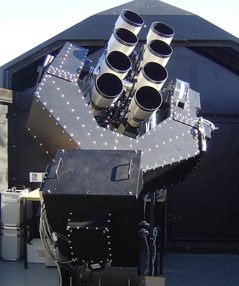Welcome to the WASP website

SuperWASP is the UK's leading extra-solar planet detection programme. It originally comprised a consortium of eight academic institutions: Cambridge University, the Instituto de Astrofisica de Canarias, the Isaac Newton Group of telescopes, Keele University, Leicester University, the Open University, Queen's University Belfast and St. Andrews University. The WASP project is currently funded and operated by Warwick University and Keele University.
SuperWASP consists of two robotic observatories that operate continuously all year around, allowing us to cover both hemispheres of the sky. The first, SuperWASP-North is located on the island of La Palma amongst the Isaac Newton Group of telescopes (ING). The second, SuperWASP-South is located at the site of the South African Astronomical Observatory (SAAO), just outside Sutherland, South Africa. The observatories each consist of eight wide-angle cameras that simultaneously monitor the sky for planetary transit events. A transit occurs when a planet passes in front of its parent star temporarily blocking some of the light from it (see the How it works section). The eight wide-angle cameras allow us to monitor millions of stars simultaneously enabling us to detect the rare transit events. Details of the planets discovered by the WASP project can be found here.
Please take the time to explore our site and check back regularly for updates. If you have any questions please feel free to contact us at the address below.
SuperWASP Public Archive can be found here (US) or here (CZ)
A catalogue of the physical properties of transiting planetary systems TEPCat
Acknowledgements
The SuperWASP project is currently funded and operated by Warwick University and Keele University, and was originally set up by Queen’s University Belfast, the Universities of Keele, St. Andrews and Leicester, the Open University, the Isaac Newton Group, the Instituto de Astrofisica de Canarias, the South African Astronomical Observatory and by STFC.
The Zooniverse project on SuperWASP Variable Stars is led by Andrew Norton (The Open University) and builds on work he has done with his former postgraduate students Les Thomas, Stan Payne, Marcus Lohr, Paul Greer, and Heidi Thiemann, and current postgraduate student Adam McMaster.
The Zooniverse project on SuperWASP Variable Stars was developed with the help of the ASTERICS Horizon2020 project. ASTERICS is supported by the European Commission Framework Programme Horizon 2020 Research and Innovation action under grant agreement n.653477
VeSPA was designed and developed by Adam McMaster as part of his postgraduate work. This work is funded by STFC, DISCnet, and the Open University Space SRA. Server infrastructure was funded by the Open University Space SRA.